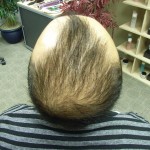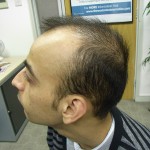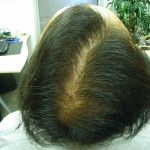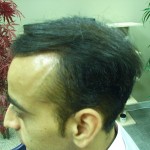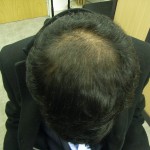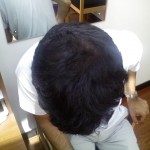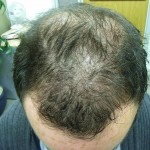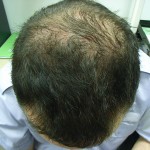22.10.2008
in MALE HAIR LOSS
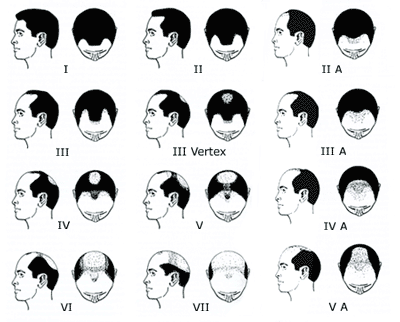
What is male hair loss (MPB/androgenic alopecia)?
Male hair loss is the most common type of hair loss. It is caused by increased sensitivity to male sex hormones (androgens) in certain parts of the scalp, and is passed on from one generation to the next generation.
Baldness is often seen as something unfortunate and very undesirable. This attitude has changed over the years and today a clean-shaven head is usually considered both extremely fashionable and attractive.
What causes male hair loss?
Most men have areas on the scalp that are very sensitive to the male sex hormones that circulate in men’s blood. The hormones make the hair follicles – from which hair grows – shrink over a period of time. They gradually become so small that they cannot replace and reproduce the lost hairs. The follicles are still alive, but are no longer able to perform their task of supporting normal acceptable growth.
This hair loss condition normally starts in men aged 20 to 30 years of age and follows a typical pattern (as shown above). Firstly, a receding hairline develops, and gradually the hair on top of the head also begins to thin throughout. Over time, the two balding areas meet to form a typical U-shape around the back and sides of the head. The hair that remains is often finer, weak and inferior and does not grow as quickly as it used to.
Can male hair loss be prevented?
Male hair loss is genetically determined (passed on from one generation to the next). Although a trichologist can offer medical treatment to improve the condition, this may have side effects.
What can be done at home?
You need to decide how you feel about your hair loss. Male hair loss affects a large part of the male population and people react very differently to it.
It is very important to try to accept hair loss for what it is – something natural. Rather than trying to camouflage bald spots with remaining hair or a wig (hair replacement system), it is a better idea to leave your hair as it is, or shave it off completely. If, however, you decide to try to regain your hair, possible medical treatments are discussed below.
How is male hair loss treated?
Baldness is generally regarded as natural, and not a disease. So if a person decides they wish to try to get their hair back, they will probably have to pay for the lengthy, expensive procedure themselves.
Treatment with medication
Minoxidil lotion is applied twice daily to the scalp. Minoxidil was originally invented as a treatment for high blood pressure; the hair growth is a side effect that, in this case, has proved useful. It is not available on NHS prescription, but is available on a private prescription at a higher and much more effective strength direct from your trichologist. About 60 per cent of patients benefit from it to varying degrees and its effects start to wear off as soon as it is stopped. In otherwords, this treatment works but must be used continuously.
Finasteride (Propecia) is a medicine taken in tablet form that partially blocks the effects of the male hormones (an ‘anti-androgen’). It is used in a higher dose to reduce the size of the prostate gland in men with benign prostatic hypertrophy. Propecia has been shown to halt further hair loss and promote re-growth of scalp hair in approximately 80 per cent of patients after three to six months. Treatment must be continued to sustain the improvement in hair growth. It is only available on private prescription, so speak to your trichologist for advice and help.
Plastic surgery
Plastic surgery may be the only reliable way to replace lost hair, and techniques for restoring hair growth are constantly improving. These include:
a transplant, where the surgeon moves non-sensitive hairs from the back of the head to the top. This is best for men whose hair loss is limited to the front of the scalp. Factors that determine whether a person is a suitable candidate include age, hair colour, the nature of hair loss, and whether the hair type is straight or curly.
scalp reduction, a technique that is most suitable for men with a small, well-defined bald spot on the top of the head.
flap-surgery, which involves making the part of the scalp that still contains hair larger. This is a possibility in cases of hair loss over a small area.
Hair loss in women
Women can also suffer hair loss, especially those with many relatives who are also prone to losing their hair.
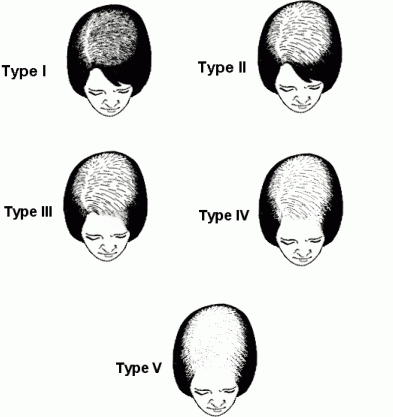
The female pattern sets in at a later age than in men and is usually limited to the top of the head. Total baldness is rarely seen in women.
Again, for treatment speak to one of our Westminster trichologist for advice.
Do you have Hair Loss Problems, read our Hair Loss Help






